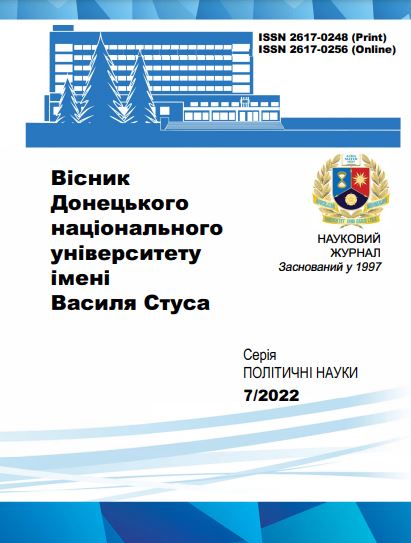Main models of political communication and their manifestations in the modern era
DOI:
https://doi.org/10.31558/2617-0248.2022.7.4Keywords:
public dialogue; political discourse; public communication; models of political communication; political language; propaganda; manipulation; totalitarianism; democracyAbstract
It is noted that the concept of social communication is quite important and influential in modern society, determining its type and form of power relations. It has been proven that information and communication technologies are changing during transformational changes in all spheres of human life, traditional mass media are being replaced by so-called social media. In the modern era, this form of political communication has become the most popular means of conveying information to the population.
The main platform for creating new socio-political communications is currently provided by the Internet, virtual reality of which has unlimited opportunities for this process.
The main features of democratic and totalitarian models of political communication, which possess a large number of various language tools, are substantiated.
Manifestations of the manipulative nature of public speech, which is present in the totalitarian model of political communication, are identified. It is shown that such types of rationality were formed during the Soviet times, which, together with the value priorities that were formed earlier, changed the political discourse under the old regime to a state of «clinical» monologism. Important socio-economic events and political decisions became tools of propaganda.
The phenomenon of simulation of democratic governance, which was the most widespread in political life in the so-called post-communist period, is substantiated.The practice of «double morality» has become a characteristic feature of the Soviet-style public consciousness and the system of «internal censorship», which is one of the elements of such consciousness. It was concluded that political discourse under such conditions is practically impossible.
It was determined that public dialogue in post-communist countries is largely distorted by totalitarian values and traditions of totalitarian political language. This greatly complicates the process of transition to a democratic political discourse, which is one of the sources of legitimacy of the institutions of a developed civil society.
References
Fairclough N. (1989) Language and Power. N.Y., 259.
Дяченко О. (2016) Особливості мовно-маніпулятивного впливу за різних типів політичного режиму. Актуальні проблеми політики. Одеса, 58, 29–40.
Фуко М. (1997) История безумия в классическую епоху. СПб., 576.
Єфтєні Н. (2015) Політичне маніпулювання: особливості застосування. Актуальні проблеми політики, 56, 234–241.

